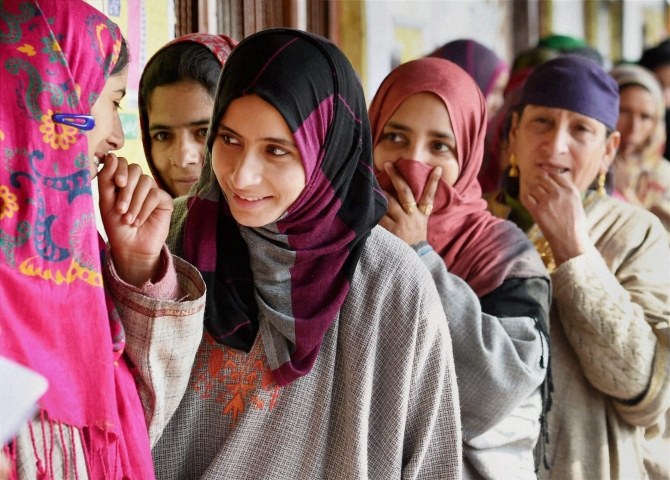Many a Lesson From One Election
The voters of the valley

SRINAGAR: In many ways the Jammu & Kashmir Assembly Elections 2014 have been game changing and history defining.
For starters, the voters while defying the routine and rhetorical boycott calls given by the resistance camps led by Syed Ali Shah Geelani, Mohammad Yasin Malik and other leaders like Nayeem Khan and Shabir Shah voted in unprecedented numbers in the Kashmir Valley.
This people’s defiance should serve as an eye-opener and the final wake-up call for the resistance leadership.
The people in the Muslim-majority Kashmir Valley voted in large numbers partly to keep the Hindu right wing Bharatiya Janata Party (BJP) at bay, to a certain extent against the corrupt practices and mis-governance of the National Conference (NC) during its six-year rule from 2009 until 2014, and also for factors like development, employment, flood relief and rehabilitation and better governance agenda.
The role played by the moderate faction of the All Parties Hurriyat Conference (APHC) led by Srinagar based head priest, Mirwaiz Umar Farooq, during the elections was pretty ambiguous. Going against its old practice of issuing election boycott calls and launching of anti-election campaign, the Mirwaiz’s amalgam did not make any such passionate appeals this time around.
As a matter of fact, in one of his Friday sermons after the elections, Umar Farooq himself acknowledged the importance of local administrative issues, need for better roads, uninterrupted electricity, pure drinking water, employment and healthcare, etc.
Farooq, in one of his Friday sermons at Srinagar’s Central Mosque (Jama Masjid) cautiously acknowledged the people’s need for ‘bijli, sarak and pani’ (electricity, road and drinking water) but hoped that people remained “unwavering” and “united” in relation to their region’s political dispute as well in the same manner they were in rescue and relief work during the devastating September Floods of 2014.
Other doubts about Mirwaiz Hurriyat’s role were removed after senior leader of the APHC (M), Professor Abdul Gani Bhat, met the current Chief Minister, Mufti Mohammad Sayeed.
Also, most of the key resistance leaders including Yasin Malik and Syed Ali Geelani were either arrested or kept under house arrest. They did not get a level playing field to go before the people with their opinion on the electoral process.
Secondly, soon after the election results were declared there was some candid politics from the resistance camp, especially from the pro-Freedom Jammu & Kashmir Liberation Front (JKLF) chief Mohammad Yasin Malik. The JKLF chief admitted that the “Indian wisdom has defeated us (the Azadi camp).”
“I accept my defeat. But I’m a freedom fighter. We will rise again. And if India fails in Kashmir, she will not get a second chance,” Malik told journalists in his Srinagar press conference.
Thirdly, Mufti Sayeed played his political cards well by crediting Pakistan, the Hurriyat and Kashmiri militants for “creating conducive atmosphere for smooth conduct of elections in Jammu & Kashmir.”
Mufti’s statement annoyed his alliance partner BJP but the statement was carefully crafted and meant to address four constituencies at the same time. Mufti addressed Pakistan, the Hurriyat Conference, militants and Kashmiri voters all at the same time. His statement ended up irking the BJP and confusing the NC and Congress.
Fourthly, the biggest message of these elections has been that the people of Kashmir have perhaps learnt the art of de-linking their larger political aspirations from the day-to-day matters related to local governance and routine administration.
They have perhaps realised that until their larger political goal is achieved it was important to have better healthcare for all, quality educations for their kids, better roads, electricity, water, employment opportunities and peaceful atmosphere for all-round growth of the society.
Only the time shall decide whether that is “political maturity” or opportunism.
On the flip-side though, some educated youth have been joining militant ranks in recent times that highlights the dangers of choking of democratic space for dissent, intellectual radicalization of sections of the society and multi-layered complexities involved in the Kashmir conflict.
The 2014 elections have a lesson for every single stakeholder.
The political parties have to realise that no one in Kashmir is indispensable. If the NC can be punished for mis-governance, corruption of scandals and insensitivity towards the people so can be the PDP for taking people’s verdict for granted and allying with the Hindu rightwing for short-term political gains.
The PDP must realize that people’s memory isn’t weak. The PDP-BJP coalition in spite of the deep ideological divide between the two parties might still hold for next six years but on the home turf it remains a political suicide and gamble for Mufti’s PDP.
In the 87-member J&K Assembly the NC got only 15 seats in 2014. Hopefully, the NC should have realised by now that the party has only its anti-people policies to blame for its near decimation.
All said and done, all factions of the Hurriyat Conference, JKLF and Jama’at-e-Islami (JeI) have to be more accountable to their people for their overt and covert actions. The ambiguity has to go. In a place like Kashmir the perceptions matter and their leaders should know that more than anyone else.
Lastly, there is a question for the people of Kashmir too. To make their leaders accountable they too have to remove the double-standards and decide for once what is more important for them. Only subjects with integrity and credibility should have desires for a credible leadership.
In short, it is a moment for one and all to revisit their respective strategies. Yes, including the media.



